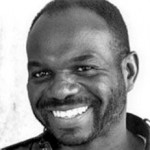Open the art book Our Light Through Darkness and you’ll find beautiful photography, illustrations, essays and poems by and for LGBTQ African-American artists. You’ll also see a gorgeous spectrum of body types and gender expressions, and you’ll read attention-grabbing titles, such as “I Hope You Catch AIDS and Die,” among the empowering HIV survivor stories.
LaQuann Dawson, a photographer who curated the book for Impulse Group New York City, an HIV nonprofit, says of the book’s title: “There is so much darkness in our lives and so much hiding we have to do as queer people and Black people and so much silencing and overall lack of visibility. But when you see us and we are visible and get to present ourselves and get to be ourselves, it’s so bright and beautiful and strong and powerful.”
Traditionally, Impulse Group NYC hosts an annual fall fundraising party to benefit two local HIV organizations, but because of the COVID-19 pandemic, the 2020 event couldn’t be held in person. After brainstorming, the group and Dawson decided to publish a fundraising art book (order a copy at OurLightThroughDarkness.com) that champions the queer Black creative community and encourages folks to embrace their bodies and sexuality—kinks, fetishes and all. “I wanted this book to confront the things we are taught to be afraid of and hide,” Dawson tells POZ. “I wanted this book to be a little louder about it, without a filter or restrictions.”
He notes that some of the artists in the book are living with HIV. Since moving to New York, Dawson says, “I’ve encountered really talented artists and writers who are living with HIV, and I think of HIV as something we’ve been taught to fear and be afraid of. I wanted this book to show these people in a more honest way. It’s something that needs to be normalized and [not presented as] such a tragic thing. We need to understand that people living with HIV are people with emotions and feelings and kinks—and I wanted to focus on this with their inclusion [in the book].”
“It was very pertinent to highlight Black and brown queer and trans people—and HIV—and even those who have disabilities,” says Impulse Group NYC president Drey Armbrister (click here to read our interview with him). “And due to racial injustices,” he adds, “we wanted to speak on being revolutionaries. I describe the book as a visual manifesto for our resistance. In this book, we own our journey and road map unapologetically.”






















Comments
Comments